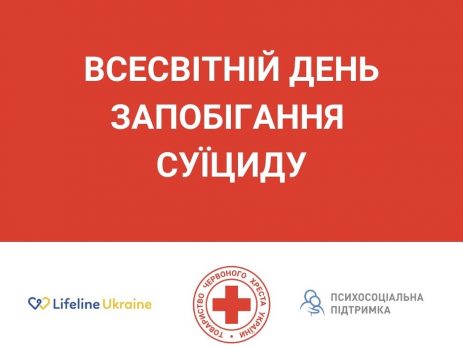10 September: World Suicide Prevention Day
On 10 September, World Suicide Prevention Day, we remind you that support is crucial for everyone, not just those in crisis.
We offer tips to help prevent mental health issues, build resilience against life’s challenges, and manage negative thoughts:
- You are not alone. Reach out to a friend, family member, or therapist. Do not keep thoughts of suicide a secret. If you cannot find someone willing to listen, keep searching. It may be helpful to make a list of people you can turn to in a crisis.
- Suicidal thoughts are often linked to problems that can be resolved. If you cannot see solutions right now, it only means that they are not visible to you at the moment. Seeking professional help can assist you in finding alternatives.
- Emotional crises are temporary. It is important to remember that crises do end. Issues that seem overwhelming now, such as financial problems or losing a loved one, will become less painful and more manageable over time. It is normal not to feel this way immediately. However, knowing that problems often become more controllable can help you maintain hope.
- Reasons to live can help you get through hard times. Reflect on what has supported you in the past: family, hobbies, future projects. If you are currently separated from family or friends, try to reconnect with them or build new relationships. Engage in meaningful activities or projects. Having a life project and strong relationships are powerful ways to counter negative thoughts.
- Distance yourself from anything that could be used to harm yourself. Avoid media or other sources that might be related to a suicide plan. It’s important to commit to life not only through positive thoughts and words but also through concrete actions.
- Avoid alcohol and other harmful substances. Remove any dangerous substances from your home, even if you don’t have an addiction. If you are struggling with addiction, continue attending a support group or consider joining one.
- Avoid tasks that you find challenging or that do not go well until you feel better. Overexerting yourself can make things worse. Make your well-being and recovery your primary concern.
- Plan your daily activities. Aim to include at least two activities that last more than half an hour each. Choose activities that you enjoy and that do not cause stress, discomfort, or anxiety.
- Engage in social interactions. Rebuilding social connections is crucial. Remember, while not everyone may be able to listen to your problems, they can offer support in other ways. Reach out to friends, join groups or seminars, and participate in events.
- Take care of your physical health. Maintain a balanced diet and engage in low-impact exercise. If you experience any health issues or discomfort, consult a doctor. Even if you’re in good health, routine check-ups are important.
- Maintain an optimistic outlook on the future. Keep in mind that many people who have experienced suicidal thoughts or attempts have recovered and are leading fulfilling lives.
If you have experienced difficult events or emergencies and are struggling to cope with the consequences, please reach out to a professional psychologist via the Ukrainian Red Cross national hotline: 0 800 332 656 (Monday through Friday, 09:00-18:00).
This initiative is supported by the European Commission under the #EU4Health programme.

